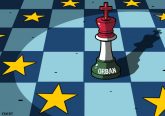“Interesting times await us in any case.” That is the enigmatic and yet telling prognosis Professor Jan Zielonka extracts from an array of convoluted developments in recent European politics. Surveying sharp discrepancies in national employment levels, debt crises, anti-establishment political parties, and creeping disengagement against the backdrop of constant cacophony, Professor Zielonka explores the divergent effects of integration, the changing role of state actors and the prospects of the European Union in the not-so-distant future.
The title of your book – Is the EU doomed? – is very provocative.Since when have you asked yourself this question?
Each crisis is different. When De Gaulle caused the “empty chair crisis”, public opinion stayed out of it. What we have seen since the failure of the Constitution is that the public have entered the European arena very forcefully, and the public is not very supportive. With the Euro crisis public trust has decreased further in both creditor and debtor states. More importantly, it decreased in formerly euro-enthusiast states and has not recovered since. The reason is a problem of cohesion. Some states are doing better than others. For example, Spain had the same unemployment levels as Germany a decade ago. Now Germany’s is below 5% and Spain’s is around 25%. This is an enormous difference and those doing better are not happy to bail out the ones doing worse. We can’t have a union where the gap is getting wider.
The first of the book’s five sections speaks about the crises in Europe; economic problems, political brinkmanship, and institutional rigidity. Germany’s game of chicken with Greece in the Eurozone can be seen in these terms. Can this be resolved?
Very easily. In macro-economic terms, Greece is not a big problem. The problem is that what Syriza wants is not envisaged in the Fiscal Compact and there is a fear of creating a precedent. If Greece is allowed to reschedule or renege on its debt, what signal does this send to those with much larger debts, like Italy? And there is a political side. Who is the most against? The answer is the Spanish Prime Minister, because he has Podemos knocking at the door of the Spanish Parliament. If Syriza gets their way, maybe Podemos will too.
You discuss various possible scenarios of EU disintegration; a loss of control, mismanaged reform, and benign neglect. Over the course of the year since the publication of your book, have any of these scenarios begun to play themselves out?
At the height of the Euro crisis, the ‘big bang’ external shock scenario was discussed most frequently, but it is less so today. We don’t know where the next shock will come from. Perhaps a sudden ‘Grexit’ will provoke an unexpected reaction from the markets? Because we don’t know, we think we can get away with ‘benign neglect’. Politicians are not really trying to reform. Cameron’s agenda, for instance, is clearly not an agenda for Europe, it is an agenda for the Conservative party. On the other side, there is no ‘Plan B’ and the narrative ‘we are reforming the EU as we go along’ is not convincing the public or the markets.
This can continue for some time in the absence of external shocks. We have seen it in the past. For several decades the Western European Union occupied administrative offices, adopted resolutions, and was written about by PhD students, but didn’t solve security crises. The same can apply to the EU. Because formal EU institutions can’t solve Europe’s problems, they are addressed informally. The Fiscal Compact, the only substantive reform since the Constitution, was adopted outside the EU treaties. These informal arrangements are not always bad, but they aren’t bringing us together, they are tearing us apart. They emphasise the power politics that we were supposed to get rid of.
Is the recent victory in Poland of the Right-wing Law and Justice party candidate, Andrzej Duda, indicative of future developments concerning integration?
The cleavages in Europe on integration are not between Left and Right, but establishment and anti-establishment. Establishment parties on the Left and Right get into bed together to defend against these anti-establishment parties that themselves don’t have much in common except their criticism of the EU, which is an easy target.
In Poland, the presidential election showed the anti-establishment candidate, Paweł Kukiz, take 20% from nowhere. Poles are largely pro-EU because Poland is exceptional in how much of a boost it has had since joining the EU. But Kukiz didn’t win, Andrzej Duda did. He is not anti-European, but he is not pro-European either. The Law and Justice party is closer to Cameron’s position, but not on the issue of migration. The fact that these can’t work together tells you how complicated decision-making is and why paralysis is what we are confronted with.
Your book’s notion of a ‘Neo-medieval’ model of integration and polyphony represents a challenge to both predictions of a ‘two-tiered Europe’ and a ‘United States of Europe’. Why is it better?
What we have today is not nation-states becoming a European state, because states will not willingly surrender complete sovereignty. What we have today in Europe is ‘hybridity’ or a ‘Neo-medieval’ system of various centers of authority. The EU is still Westphalian and does not allow other actors than states to have a place at the decision-making table. Mini-states like Latvia have it, failed states like Cyprus have it, but the City of London or Greenpeace do not. So there is a discrepancy.
‘Polyphony’ furthers integration. It is the opposite of the current ‘cacophony’. Harmony can be attained not solely by proceeding top-down, but bottom-up. We have to break the monopoly of states over matters of integration and let others in, not along territorial lines, but functional ones. This requires decentralization, devolution, as well as different rules and membership for different fields of integration. If you disperse power, you have fewer problems controlling it.
Now, the above is not perfect, and will not solve all of our problems. But it is important to remember that integration can help or hinder our economy and democracy. Today, the EU is generating economic conflicts and compromising democracy. We need to have a discussion about a ‘Plan B’ and we should not label those engaged in it as Eurosceptics. I am pro-European, but if we don’t change in a profound way, we will end up with Farage, Le Pen, and Wilders running Europe because things are becoming too easy for them.
Your vision is one of a ‘European’ reintegration. Will there a place for the EU in this new Europe?
It depends which model of reintegration occurs. Over time actors will do things together regardless of the EU, partly with it, partly without it. This does not mean the state will die, but it will play a different role. It won’t have a monopoly on integration anymore.
We can’t go back to nation-states in our interdependent environment. The implosion of borders due to immigration, communication, and economics means we need sophisticated and integrative solutions. We are condemned to cooperation, if not integration, and we have to improve on the way we have done it over the course of the past decade. I don’t question the achievements of the EU, but at a certain moment it got stuck and it needs to reinvent itself. So far, it have been unable to do so, but who knows? Other solutions may arise. Interesting times await us in any case.









No Comment